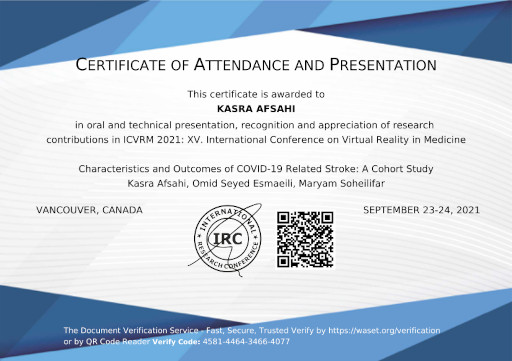Clinical Trials
Effects of Virtual Reality on the Upper Extremity Spasticity and Motor Function in Patients with Stroke: A Single Blinded Randomized Controlled Trial.
INTRODUCTION
Cerebrovascular accident (CVA) or stroke is a disabling neurological disease with a current progressive trend of incidence especially due to urbanization. This disease is not limited to the developed countries and its annual incidence rate in developing nations has been reported 145 in 100,000 subjects that even may be seen in 10 to 15 percent of subjects younger than 40 years of that is of great public health significance because strokes in younger subjects carry the potential for greater lifetime burden of disability and because some contributing risk factors identified for this trend toward increasing stroke incidence at younger ages are modifiable…


(WHO main ID: IRCT 20200811048372N1)

Regarding use of M.S. Kinect in research setting, it is possible that patient’s movements be transferred to monitor by developed software during treatment course with motor sensor. This matter helps to develop the future actions by patient’s reflections. Such tools can increase the patient’s attention and involvement in the treatment activities. Hence in this study the effects of virtual reality plus conventional rehabilitation therapy versus conventional rehabilitation alone on the wrist and elbow spasticity and motor function beside active range of motion in shoulder abduction, wrist extension, and elbow extension in patients with stroke were evaluated .
Download Document and Read Full TextFeasibility of VR-based rehabilitation of shoulder impingement syndrome in athletes
The painful shoulder is the most common condition seen in sport injury clinics. Subacromial impingement syndrome is affected by scapular motion and position. Scapular dyskinesis is a potential impairment to optimum shoulder function which should be diagnosed and managed as an important part of a treatment protocol. Subacromial impingement syndrome is developed due to contraction of the anatomical structures passing through the subacromial fossa…
Download Document and Read Full Text

Virtual Reality in Rehabilitation of COVID-19 Patients

The novel human coronavirus disease COVID-19 has become the fifth documented pandemic since the 1918 flu pandemic. COVID-19 was first reported in Wuhan, China, and subsequently spread worldwide. In March 2020, COVID-19 was officially announced a global pandemic because of barreling 114 countries. The COVID-19 pandemic triggered significant mortality increases in 2020 of a magnitude not witnessed since World War II in Western Europe or the breakup of the Soviet Union in Eastern Europe. Near 226,000,000 have been infected with and 4,600,000 have been reported to die because of COVID-19. Post-COVID-19 patients, particularly those who needed high care, are expected to have high needs for physical, psychological and cognitive rehabilitation. Several studies on VR show its potential for rehabilitation and suggest VR to be beneficial in post-COVID-19. The immersion of VR may increase therapy adherence and may distract the patient from experienced fatigue and anxiety. A VR program implemented on a COVID-19 rehabilitation unit for patients and healthcare providers was rated as highly satisfactory with perceived benefit by survey respondents. Participants commented that the use of VR was useful in coping with isolation and loneliness, and could be implemented within the context of clinical care for COVID-19 patients as part of a comprehensive rehabilitation model.
In two clinical research projects, researchers from Recovery Tech have revealed some new findings about COVID-19-related strokes and post-COVID stroke rehabilitation using our product.
Characteristics and Outcomes of COVID-19 Related Stroke: A Cohort Study
Abstract—Background: Cerebrovascular accident (CVA) is a neurological side effect of COVID-19 disease wit high rate in pandemics. Effect of COVID-19 disease on disorder is unclear. In this cohort, patients with COVID-19 disease were assessed. Materials and methods: 60 CVA cases were assessed in a referral hospital in 2020. The major factor was mortality and the cases were those with and without death. The groups were compared for all features about mortality in the patients with COVID-19 and CVA. Results: Totally 23 out of 60 cases (38.3%) were expired. In univariate analysis there was significant association for death by ischemic heart disease (P = 0.015), high-severity stroke (P = 0.012), high CRP (P = 0.001), high ESR (P = 0.009), pleural effusion (P = 0.005), pericardial effusion (P = 0.027), cardiomegaly (P = 0.005), ground glass opacity (P = 0.001), and consolidation (P = 0.001). Among these factors, there was significant association only for C reactive protein (CRP) (P = 0.001) and consolidation (P = 0.003) in multivariate analysis. Conclusion: Mortality in the cases with COVID-19-related CVA is one-third and it has relationship to elevated CRP and finding the consolidation in the computerized tomography scan of the lungs.
Find out moreVirtual Reality for Post COVID-19 Stroke: A Case report
Abstract—COVID-19 has been associated with stroke and neurological complications. The patient was a59-year- old male presentedwith sudden left hemiparesisand diplopiadue to cavernous sinus thrombosis (CST) on 28/03/2020. The COVID-19 test was positive. Multislice CT (MSCT)showed ischemic infarction. He underwent surgical sinectomy 9 days after admission. Physiotherapybegan for him on August 2020. Our game-based virtual reality (VR) technologydeveloped for stroke patients was based on upper extremity exercisesand function for stroke. After 6 weeks of VR therapy plusconventional physiotherapy exercises(18 sessions, three times per week, 60 minutes each session),there were significant improvements in Brunnstrom Motor Recovery Stage (from “4” to “5”),Fugl-Meyer Scale score of upper extremity section (from 49to 54), and Modified Barthel Index (from15 to 18). There were no adverse effects. This case with stroke post COVID-19 due to the CST showed the usefulness of VR therapy used as an adjunct to conventional physiotherapy in improving affected upper extremity.
Find out more


